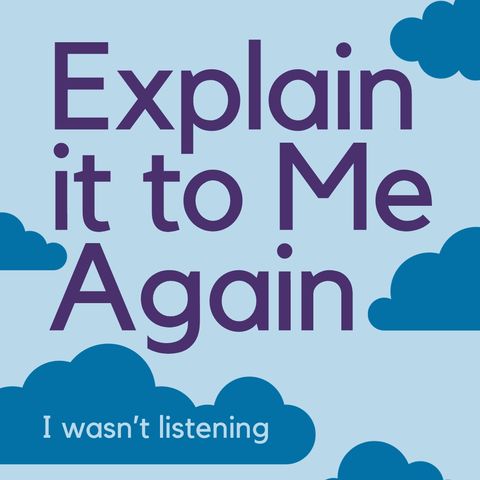
Contactos
Información
Explain It to Me Again is a podcast where two siblings explain a topic they are super interested into the other because they were not listening the first time. From...
mostra más
Explain It to Me Again is a podcast where two siblings explain a topic they are super interested into the other because they were not listening the first time. From Anthropology to Zoro, each episode is a look into a topic that each host has studied and explained endlessly. Now, we actually have to pay attention.
mostra menos

Explain It to Me Again
Explain It to Me Again
The Earliest Lesbian Director
14 DIC. 2023 · Who were the first women in film? In this episode we dive into the history of early film production and the people who made revolutionary changes to the industry. Janine explains the first motion camera, the first narrative film, the lives of Alice Guy-Blache, Louis Weber, Frances Marion and the incredible Dorothy Arzner. There is also a very lively discussion about the first ever talkie, the Jazz Singer.
Content Warning: Racism, Discussion of Blackface
To Learn More About Women In Film: https://wfpp.columbia.edu/
Sources
“ARZNER, DOROTHY – Edited By.” Women Film Editors, https://womenfilmeditors.princeton.edu/arzner-dorothy/.
Field, Allyson Nadia. “Dorothy Arzner – Women Film Pioneers Project.” Women Film Pioneers Project, https://wfpp.columbia.edu/pioneer/ccp-dorothy-arzner/.
Heckmann, Chris. “What Was the First Movie Ever Made — Film History Explained.” StudioBinder, 24 July 2022, https://www.studiobinder.com/blog/what-was-the-first-movie-ever-made/.
Lewis, Maria. “Dorothy Arzner: mother of invention.” ACMI, https://www.acmi.net.au/stories-and-ideas/dorothy-arzner-mother-invention/.
McMahan, Alison. “Alice Guy Blaché – Women Film Pioneers Project.” Women Film Pioneers Project, https://wfpp.columbia.edu/pioneer/ccp-alice-guy-blache/.
Ruvoli, JoAnne. “Frances Marion – Women Film Pioneers Project.” Women Film Pioneers Project, https://wfpp.columbia.edu/pioneer/ccp-frances-marion/.
Stamp, Shelley. “Lois Weber – Women Film Pioneers Project.” Women Film Pioneers Project, https://wfpp.columbia.edu/pioneer/ccp-lois-weber/.
How Language Shapes Our Thoughts
30 NOV. 2023 · Does language change how we think? This episode dives into the Sapir-Whorf Hypothesis and the different theories about the ways language alters our thoughts. We also discuss the men behind the theories and the languages they studied. Roxanne teaches linguistics 101 and Janine talks about how language relates to identity.
Sources
Chandler, D. (1994). The Sapir-Whorf Hypothesis. Visual Memory. http://visual-memory.co.uk/daniel/Documents/short/whorf.html
Green, R. (2023). The Sapir-Whorf Hypothesis: How Language Influences How We Express Ourselves. Very Well Mind. https://www.verywellmind.com/the-sapir-whorf-hypothesis-7565585
Pelletier, F. J., Pullum, G. K., & Nefdt, R. (2022). Whorfianism. Stanford Encyclopedia of Philosophy. https://plato.stanford.edu/entries/linguistics/whorfianism.html
The Editors of Encyclopaedia Britannica. (2023). Benjamin Lee Whorf. Britannica. https://www.britannica.com/biography/Benjamin-Lee-Whorf
The Editors of Encyclopaedia Britannica. (2023). Edward Sapir. Britannica. https://www.britannica.com/biography/Edward-Sapir
(2023). Yucatec Maya Color Words (Mayan). Native Languages.org. http://www.native-languages.org/maya_colors.htm
Explícito
The Origin of the Vampire Myth
23 NOV. 2023 · In this episode, Roxanne discusses the origin of the vampire myth. Were vampires based on a man, a woman, or a legend? We go through the etymology of the Vampire, the people suspected to be vampires, and what truly spawned the myth of the vampire.
Warning: Language and Graphic Content (decomposition)
Sources:
(2022). Cholera. Mayo Clinic.https://www.mayoclinic.org/diseases-conditions/cholera/symptoms-causes/syc-20355287(2022).
Cholera- Vibrio cholera infection. Centers for Disease Control and Prevention.https://www.cdc.gov/cholera/illness.html#:~:text=Cholera%20is%20an%20acute%20diarrheal,be%20severe%20and%20life%2Dthreatening.
Hall, C. (2022). The Horrors of History: Vampires. Ashland community and Technical College.https://ashland.kctcs.edu/blog/posts/untitled.aspx
Kelly, J. (2020). How the Spread of Disease Juiced the Lore of Vampires Into Pandemic Proportions. UVA Today.https://news.virginia.edu/content/how-spread-disease-juiced-lore-vampires-pandemic-proportions
Pitlick, H. (2022). The Science Behind Vampires. Bloodworks Northwest.https://blog.bloodworksnw.org/the-science-behind-vampires/
Stepanic, S. (2021). The Great Vampire Epidemic: How the Myth of Dracula was Born from Disease and Folklore. Milwaukee Independent.http://www.milwaukeeindependent.com/syndicated/great-vampire-epidemic-myth-dracula-born-disease-folklore/
Stoker, D. & Barker, J. D. (2018). Bram Stoker Claimed That Parts of Dracula Were Real. Here’s What We Know About The Story Behind the Novel. Time.https://time.com/5411826/bram-stoker-dracula-history/
Tedesco, L. (2020). Real-Life ‘Vampires’ Did Exist, And This Is What Happened To Them. The Travel.https://www.thetravel.com/who-was-the-first-real-vampire/
Tucker, A. (2012). Meet the Real-Life Vampires of New England and Abroad. Smithsonian Magazine.https://www.smithsonianmag.com/history/meet-the-real-life-vampires-of-new-england-and-abroad-42639093/
Wenzel, D. (2019). History course on Dracula goes beyond the story of a bloodthirsty killer. Uchicago News.https://news.uchicago.edu/story/history-course-dracula-goes-beyond-story-bloodthirsty-killer#:~:text=Bram%20Stoker's%20Dracula%2C%20the%20iconic,Romania%20named%20Vlad%20the%20Impaler.
Wilson, K. M. (1985). The History of the Word “Vampire”. Journal of the History of Ideas, 46(4), 577-583.https://doi.org/10.2307/2709546
Explícito
The Man Who Changed How We Study Culture
15 NOV. 2023 · For the first episode of Explain It to Me Again, Roxanne is going to dive deep into the revolutionary ideas of a pivotal cultural anthropologist, Franz Boas. We discuss the previous old school thoughts on studying culture, the early life of Boas, his studies, his students, and how he revolutionized the study of culture.
Language Warning
Sources:
Erickson, P. A, & Murphy, L. D. (2016). A History of Anthropological Theory (5th ed.).
University of Toronto Press.
Erickson, P. A, & Murphy, L. D. (2016). Readings for a History of Anthropological Theory (5th ed.). University of Toronto Press.
Lewis, E. (2020). Franz Boas, Father of American Anthropology. ThoughtCo.https://www.thoughtco.com/franz-boas-4582034
Tax, S. (2023). Franz Boas: German-American Anthropologist. Britannica. https://www.britannica.com/biography/Franz-Boas
Tylor, E. B. (1920) [1871]. Primitive Culture. J.P. Putnam’s Sons.
Explain It to Me Again is a podcast where two siblings explain a topic they are super interested into the other because they were not listening the first time. From...
mostra más
Explain It to Me Again is a podcast where two siblings explain a topic they are super interested into the other because they were not listening the first time. From Anthropology to Zoro, each episode is a look into a topic that each host has studied and explained endlessly. Now, we actually have to pay attention.
mostra menos
Información
| Autor | Sitch Radio |
| Organización | Sitch Radio |
| Categorías | Historia |
| Página web | - |
| brian@sitchradio.com |
Copyright 2024 - Spreaker Inc. an iHeartMedia Company
